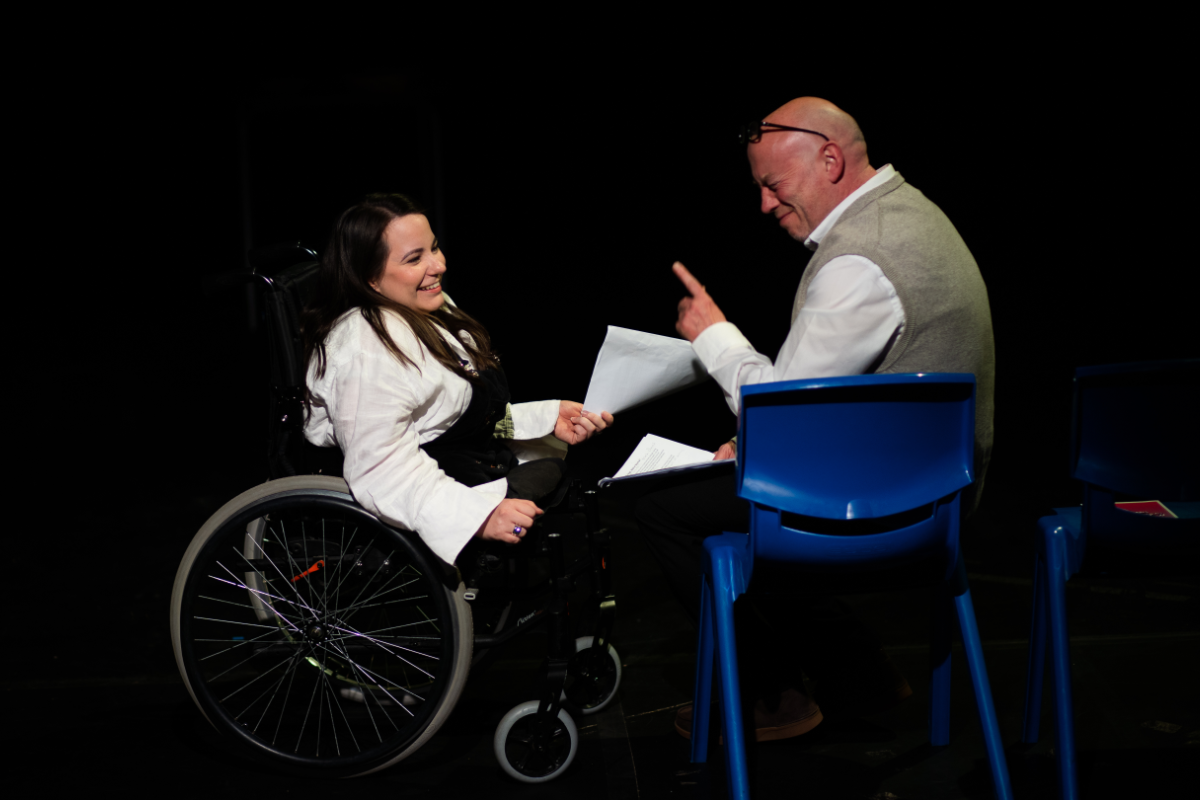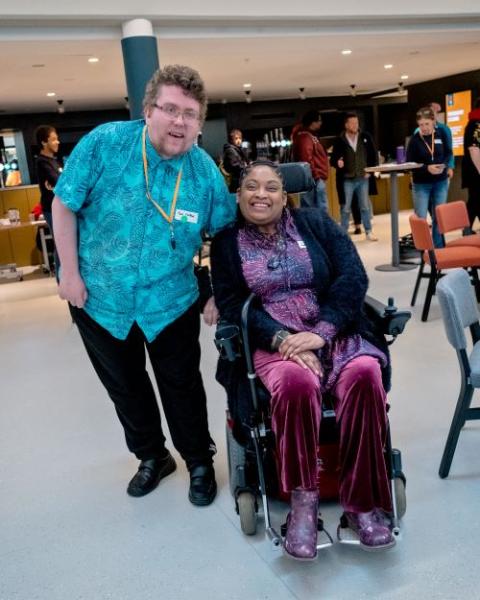
'Introduction To' sharing in the Bramall Rock Void at Leeds Playhouse
Photo: Becky Payne
Access shouldn’t be an afterthought
Leeds Playhouse runs courses for D/deaf and disabled artists wanting to enter the theatre. Rio Matchett shares what they have learned through this access work.
Over the last six years, Leeds Playhouse has been on a journey around access. Serving our communities has always been at the heart of the Playhouse since the people of Leeds launched a campaign in the 1960s demanding a theatre for their city – we were the result.
Our ongoing access work fits naturally into this core purpose, but it’s only in recent years that the urgent need to remove barriers to disabled people creating and watching theatre has reached the mainstream.
We have prioritised access work as around 14.6m people in the UK are disabled. This figure includes 21% of working age adults and around 42% of pension-aged adults, while those of us who aren’t yet disabled likely to become so later in life. With these facts in mind, it becomes not only a moral imperative but a compelling business decision to make theatre accessible to people who are D/deaf and disabled.
Lessons from integrated access
Leeds Playhouse has learned about the creative possibilities of integrated access through our partnerships with Ramps on the Moon, Mind the Gap, and numerous other organisations led by and for disabled people. Whether it’s creating audio description introductory notes for a show or incorporating British Sign Language and Visual Vernacular into Shakespeare performances, we regularly see how much integrated access benefits our entire audience.
I’ve never seen a group of 14-year-old students more engaged in a 500-year-old play than when actor Benjamin Crawley, playing Ross, broke the news of Macduff’s family’s death using sign language in Amy Leach’s production of Macbeth.
We introduced access riders for our cast members with a view to looking after our disabled colleagues but found everyone benefits from articulating what they need to do their best work. For example, some people might need a regular bathroom break, but everyone can take advantage of an extra ten minutes to consolidate a session.
Our work on integrated access will continue for years to come, and we’re indebted to our D/deaf and disabled colleagues for continuing to share their expertise with us. Of course, independent companies have been doing this work for decades. But as we’ve grown in confidence, we’ve looked for new opportunities to develop further, which has led to artist development feeling like an obvious and indispensable next step.
Prioritising artist development
Artist development is a core pillar of Leeds Playhouse. Under the banner of our development engine Furnace, we put a significant amount of money every year towards training directors, writers, producers and artists, as well as supporting new ideas and independent projects. As the custodians of a substantial public resource, we know it’s vital for us to advocate for and work with artists, removing as many barriers to engagement as we can. This includes ensuring every opportunity for artists developed through Furnace is free.
We partnered with Sheffield Theatres to run three ‘Introduction To’ courses in writing, directing and producing for artists who are D/deaf, disabled, learning disabled and neurodivergent. We targeted these creatives because we know they have historically been unable to access development opportunities, but they have exciting and universal stories to tell which speak to the broadest reaches of our audience. We knew we were unlikely get everything right, so we collaborated to identify potential barriers to participation, while remembering that getting things wrong is sometimes the only way to learn.
 Leeds Playhouse Agent for Change Paul Wilshaw and Artist for Change/Writer in Residence Leanna Benjamin. Photo: Anthony Robling
Leeds Playhouse Agent for Change Paul Wilshaw and Artist for Change/Writer in Residence Leanna Benjamin. Photo: Anthony Robling
Over eight weeks, 24 artists were offered a series of theoretical and practical sessions to develop their craft. It was vital these sessions were taught in partnership with established disabled artists, so we worked with learning disabled producer and theatre maker Paul Wilshaw, disabled playwright Leanna Benjamin and blind actor, director and consultant Benjamin Wilson, who shared their lived experiences of negotiating and succeeding in the industry.
As some of our artists were shielding from Covid, while others had caring responsibilities, sessions were held both online and in person at the two theatres. We had note-takers in every session and spent time with each artist to ensure they got what they needed from the course.
At the end, we shared monologues and duologues written, directed and produced by the artists. Some platformed disability politics and themes, while others depicted love stories, friendship and dystopian futures, which highlighted that, just like non-disabled artists, the work of disabled artists span a multitude of topics.
Creating a legacy
After the course concluded, our participating artists requested a place to continue their creative and political conversations, which led to the creation of Yorkshire Disabled Creatives Network, a partnership between Leeds Playhouse, Barnsley Civic, and Sheffield Theatres.
Individuals who took part in the course have since gone on to gain commissions, produce shows, connect with other theatres to research and develop ideas, and work alongside teams on major national tours.
So, what have we learnt from our ‘Introduction To’ courses? Firstly, we now know we need to factor in more time to allow for people’s fluctuating health and life situations. Secondly, we learned the importance of proactively inviting disabled people into our spaces, which saw us build upon on our usual offer of providing an access worker or interpreter when asked.
After decades of exclusion, it’s hardly surprising that disabled people often need an overt promise that their needs will be met. Finally, we learned the importance of working together to remove access barriers. These courses created some aesthetically beautiful, moving, joyful and truthful plays and that’s something we can all benefit from.
Rio Matchett is Furnace Producer at Leeds Playhouse.
![]() www.leedsplayhouse.org.uk
www.leedsplayhouse.org.uk
![]() @LeedsPlayhouse | @riomatchett
@LeedsPlayhouse | @riomatchett
More information on Furnace at Leeds Playhouse and Yorkshire Disabled Creatives Network is available here.
Join the Discussion
You must be logged in to post a comment.